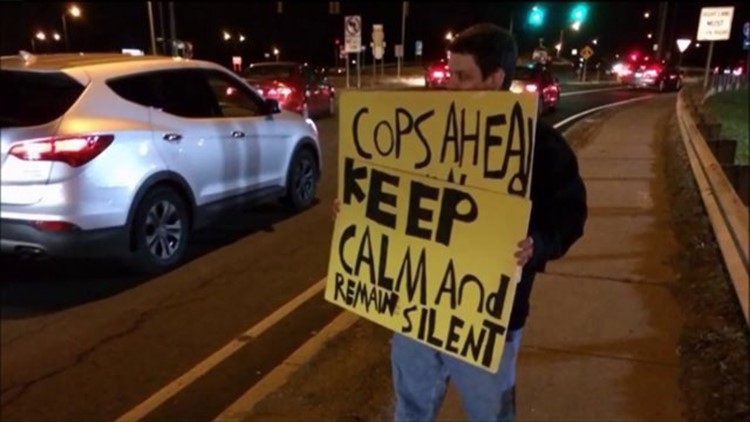HARTFORD — Connecticut State Police are citing “invasion of privacy” concerns in refusing to release the findings of an internal affairs investigation involving a trooper and two sergeants accused of fabricating charges against a sobriety checkpoint protester during an encounter recorded on video.
State police have rejected requests by The Associated Press and other media outlets made under Connecticut’s public records laws for copies of the internal affairs investigation report as well as the results of the probe, including whether the officers were disciplined. The AP recently appealed to the state Freedom of Information Commission.
The investigation centered on the encounter between protester Michael Picard, of East Hartford, and the three officers — Trooper John Barone, Master Sgt. Patrick Torneo and Sgt. John Jacobi — at a sobriety checkpoint in West Hartford on Sept. 11, 2015. According to a lawsuit filed by Picard, the officers fabricated charges against him, not knowing they were being recorded by his camera after they seized it.
The Department of Emergency Services and Public Protection, which oversees state police, cited state law and troopers’ labor contract in rejecting requests for the investigation report and its findings.
The state Freedom of Information Act says if an agency believes a request for records contained in personnel files would be an invasion of privacy, it must notify the employees involved. If the employees object, the agency does not have to disclose the records unless ordered to do so by the Freedom of Information Commission.
“The three employees have all objected … and the agency supports them in that decision,” Janet Ainsworth, a lawyer for the department, wrote in a letter to the AP.
Dan Barrett, legal director of the American Civil Liberties Union of Connecticut, is representing Picard in his lawsuit against the three officers. He said the conduct of public employees should not be shielded by privacy concerns in most cases.
“I think generally the government owes us transparency when it comes to how it treats its employees, and that’s even more important when we’re talking about employees who carry a badge and a gun,” Barrett said. “It’s important for the government to tell the public how police employees are disciplined.”
In a 2013 decision involving Waterbury police, the Freedom of Information Commission ruled internal affairs reports and complaints against police officers must be disclosed, saying disclosures about public employees are “presumptively legitimate matters of public concern.”
At the sobriety checkpoint, Barone confiscated Picard’s legally carried pistol, pistol permit and camera after making up a bogus claim that someone had complained about a man waving a gun, according to Picard’s lawsuit, which is pending in federal court. Barone also wrongly told Picard that it was illegal to record images of the officer, the lawsuit says.
The troopers are heard but not seen on Picard’s video recording calling a Hartford police officer to see if he or she had any “grudges” against Picard, initiating an investigation of him in a police database and discussing a previous protest Picard organized at the state Capitol, the lawsuit says.
After finding that Picard had a valid pistol permit, Barone tells the other troopers they have to “cover” themselves and either Torneo or Jacobi said “let’s give him something,” the lawsuit says. The troopers then wrote Picard infraction tickets for illegal use of a highway by a pedestrian and creating a public disturbance — charges that were later dismissed in court.
In court documents, the officers deny allegations of wrongdoing, say they acted reasonably and in good faith and claim government immunity from liability.



